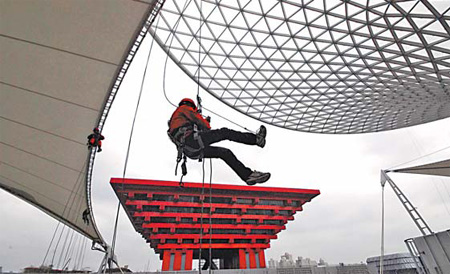Society
Date with demolition
By Qian Yanfeng (China Daily)
Updated: 2010-08-04 09:03
 |
Large Medium Small |
|
 Workers prepare for the trial run of the Expo Garden in a file photo taken on March 7. Niu Yixin / for China Daily |
Even though a plot of land bordering the Expo site on the Puxi side failed to sell in an auction in mid-July, many said the no-sale was due to an exorbitant price. Few people believe it will have any cooling effect upon the value of the Expo site.
The price of the Expo land could easily triple or quadruple by the time the event ends, according to Sun Yuanxin, deputy director of the Institute of World Expo Economy at the Shanghai University of Finance and Economics, a key government think-tank in terms of Expo economy. So the Shanghai government only needs to sell one third of the 5.28-square-kilometer Expo site to developers to recover all the costs, he said.
As to the remaining two thirds, one is the area where the five permanent structures will be retained to serve as public venues. Sun suggested that the other third be turned into green land to encourage sustainable urban development.
But according to Wan Zeng-wei, director of the Pudong Academy of Development, also a key district government think-tank, the redevelopment plan of the Expo Garden has so far failed to generate consensus among city authorities and planners.
In Pudong, which is home to about two thirds of the Expo Garden, authorities have yet to come up with a consensus regarding the specific development plans, he said.
"Although the general agreement is that the area should be developed into a major trade, convention and tourism center, authorities are divided on the details," he said.
Dai Xiaobo, a researcher with the Shanghai Academy of Social Sciences, told China Daily that one plan currently under deliberation is to develop the Pudong section of the Expo Garden as an extension of the Lujiazui Financial Zone, whose development has long been hampered by limited land resources. The extension would be critical to further Shanghai's reputation as a major international financial center by 2020, he said.
To do that, both section A and C of the Expo Garden on the Pudong side would be sold to developers to turn them into a finance and trade centralized area, he said. Section B is where the five permanent structures will be retained.
"While many remain skeptical about the government's motivation in selling the land for redevelopment, I think if the government makes decisions in line with the planning for the area, it is quite understandable. It's easy to see that this would stimulate the long-term development of the city and in turn benefit the public.
"But if the aim is to sacrifice public interests for short-term profit returns, then the credibility of the government would be greatly undermined," he said, adding the redevelopment would be a major test for the Shanghai government on whether it would uphold public interests in the urban area project.
Who owns the land?
Property rights disputes, still simmering between the government and big-name state-owned companies, may create problems in future development projects, Wan said.
Many run-down houses and factories were demolished to clear the way for Expo construction. China State Shipbuilding Corp and the Baosteel Co, both parent companies for the removed factories, maintain their ownership of the land, and the disputes have complicated the redevelopment issue.
"The government may have a difficult time negotiating with the companies, which of course want to pursue maximum interests. It's a zero-sum game between them," Wan said.
The lack of a confirmed official stance so far on the redevelopment issue has given rise to expectations that a few selected pavilions winning the hearts and favor of visitors - the vast majority of whom are Chinese - would be retained to serve as reminders of the mega-event.